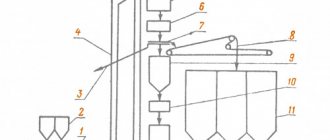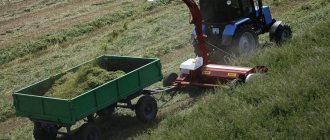Grain transportation will become more expensive in the new season. The price of fuel and spare parts is rising; from July 1, the Ministry of Transport raised the Platon tariff to 2.04 rubles.
The situation is aggravated by the fact that since the beginning of the year, carriers have had little work: on the one hand, grain exports have decreased, and on the other, low tariffs have made fair, non-overloading transportation simply unprofitable.
The next meeting of the Club of Agricultural Experts of the Publishing House "Peasant" was devoted to the topic of grain transportation in the new season.
Order by any means
The director of the National Transportation Company, Mikhail Mezentsev, warned at the XX International Grain Round that freight transportation tariffs would increase in the new season at the beginning of June.
“Kamaz drivers are very hungry and haven’t eaten anything since the New Year,” Mezentsev said, explaining that thousands of KamAZ trucks are sitting without tires and spare parts, not ready for the season, because there is nothing to repair them.
At the round table at the Peasant Publishing House, the head of the Gruzavtotrans association, Vladimir Matyagin, confirmed the words of his colleague.
– The condition of carriers is deplorable. Due to low tariffs for grain transportation, most have to work outside the legal framework. Every year the sides are increased by 10 centimeters...
There are several reasons for low tariffs, explains Matyagin. A large percentage is taken by dispatchers who direct carriers to orders; In addition, “overload” destroys the market. Unscrupulous carriers charge money (on average 1,800 rubles) for “unhindered” passage through weight and size control points, load grain two or even three times more than is allowed by law, lower the cost of transportation and dump the market. As a result, we have destroyed roads, accidents with grain trucks, and thriving corruption.
Gruzavtotrans has repeatedly stated this problem and written appeals to federal ministries, but no progress has occurred.
“We don’t trust the regulatory and supervisory authorities in the regions, so we deployed our own teams at some weighing control posts,” said Matyagin. “With our arrival, the rate for unhindered travel rose to three thousand rubles. That is, they didn’t start to restore order, but to increase the price tag! At the weight control posts, of course, they don’t give money directly - they show documents with a special mark made in Krymsk.
The head of Gruzavtotrans is confident that it is elementary to restore order: it is enough for the head of each southern region to gather grain traders in his office and tell them: “Let’s stop the mess.”
– Take Chechnya – you can’t drive there with an overload! Cars are not fined, no. They are forced to either pour out excess grain, or are offered to carry the “overload” in a detour, through other regions. Because Kadyrov promised to fire people for corruption - right up to the general. If there is a leader in the region, he will restore order by any means.
Municipalities should also join the fight against overload, Matyagin believes. No one is stopping them from going to court and demanding compensation from an unscrupulous carrier for damage caused to the roads. There was a precedent in Bashkiria: there the company received several claims for tens of millions of rubles from the executive branch.
Finally, says Matyagin, amendments to the Code of Administrative Offenses are required to combat overload. Today, for violating weight and dimensional standards, the one who transports the grain and the one who loaded it into the car can be fined. But not the one who will then unload and receive this grain.
“If there is a thief, there is an accomplice who is on guard, and there is someone who sells stolen goods, then the Criminal Code punishes all three,” the head of Gruzavtotrans gave an example. – Why is this not the case in the Administrative Code? Legislative changes are needed.
“The Peasant” invited members of the Committee on State Building and Legislation of the State Duma of the Russian Federation, deputies from the Rostov region Sergei Ivanov (LDPR) and Mikhail Emelyanov (A Just Russia), to the meeting, but both party headquarters ignored the invitations.
Types of grain trucks
Transportation of grains is a specific process that requires certain knowledge and skills. Products can be transported by the following types of rolling stock:
Onboard grain carriers . These are ordinary flatbed vehicles, the top of which is covered with a tarpaulin (so that the grain does not get wet). As a rule, the sides are expanded to be able to carry more cargo. Such machines cannot unload themselves, which complicates loading and unloading operations.
Grain trucks-road trains . In this case, a trailer is also used, which increases the carrying capacity.
Tipper grain trucks . As a rule, they transport 30-40 tons. In this case, the loading and unloading process is significantly simplified, since there is no need to involve workers.
Tanks . It is used quite rarely. From the name it is clear that grain is transported in special tanks. In this case, the products are maximally protected from the influence of external factors.
Containers (with open top). In this case, unloading can be carried out through special hatches in the floor of the container, through the rear or side hatches.
It is imperative to choose the right type of grain truck that can most effectively fulfill the tasks assigned to it. Then you need to figure out a loading method to incur the least loss. To do this, it is important to study the rules for transporting grain. As a rule, grain crops are loaded from bins at elevators or using special grain loaders (no one with shovels throws grain into the machine). Workers can only perform a number of additional works (covering the cargo with a tarpaulin, cleaning the body, etc.).
Under control – 12%
Why overload is ineradicable on Russian roads was answered at the round table by Marat Latypov, head of the department for control of international road transport of the Southern Interregional Directorate of the State Traffic Safety Inspectorate. This structure is designed to monitor the safety of federal roads and, accordingly, carries out weight and size control on federal highways. By agreement with regional authorities, Gosavtodornadzor control can be carried out on other highways.
Last year, the Southern Interregional Department checked more than 2.6 thousand vehicles transporting grain. Of these, 357 vehicles turned out to be violators - they exceeded the permitted weight and size standards. The department issued 587 decisions on bringing to administrative responsibility, of which 357 were against drivers, 96 - against legal entities, 134 - against officials.
There were suspiciously few violators, the round table participants noted. Marat Yuryevich explained: the forces and resources of the State Road Safety Inspectorate are simply not enough to control the entire flow of freight transport.
“On the territory of the Rostov region there are only 45 inspectors who can control approximately 12% of the total volume of cargo transportation,” explained Marat Latypov.
The lack of staff is compounded by a lack of authority. It is not always possible to punish violators to the fullest extent of the law. Unscrupulous carriers have learned to frame their illegal activities in such a way as to receive minimal sanctions.
“Carriers arrange grain transportation in such a way as if they leased the vehicle to the driver, and the driver – an individual – carries the cargo for his own needs,” explained Marat Latypov. – A Kamaz truck loaded with 70-100 tons of grain is driving along – the southern republics are especially guilty of this – and nothing can be done. The driver has a rental agreement in his hands, so it is impossible to issue a fine to a legal entity. And those three thousand rubles with which we can punish the driver are completely insensitive to the carrier when he earns 30 thousand on the flight.
Marat Yuryevich sees a way out in allowing commercial transportation only to legal entities, and in addition, introducing a notification procedure: Rosavtodornadzor, the State Traffic Safety Inspectorate and the Ministry of Internal Affairs must know which individual entrepreneurs and companies transport goods in Russia.
In addition, automatic weight control points will help strengthen control on the roads. Special frames that do not require stopping the vehicle instantly determine the weight and size of the loaded truck. Only in the Rostov region there is not a single such automatic point.
Grain losses
When transporting grain, some losses inevitably occur. This is due to the design of the body and other various factors. Natural losses of grain during transportation by road are given in the “Norms of natural loss of certain types of cargo during transportation by road” No. 63 dated 02.06.86. So, when transporting grain in bulk, the rate of natural loss as a percentage of the weight of the cargo is 0.07, and in containers – 0.05.
To avoid loss of cargo, the grain truck is carefully checked before loading. To accurately determine the mass of brought grain, weighing occurs in three stages:
- the grain truck is weighed with its cargo;
- the car is weighed after arriving at the specified point;
- the vehicle is weighed after complete unloading.
These are the main nuances of transporting grain by road.
The master's business
Automatic weight control can really restore order, said the plenipotentiary representative of the governor of the Krasnodar Territory for interaction with peasant farms, Vyacheslav Legkodukh.
“Vladimir Vasilyevich correctly said that the owner of the road should worry and find ways to control the pests that spoil the road surface,” agreed Vyacheslav Alexandrovich. – In the Krasnodar Territory, a regional project “All regional roads are subject to weight control” was launched last year. 10 automatic frames have already been installed and are operating; in total there will be 40 of them in the region. Vyacheslav Legkodukh spoke about the experience of the Yeisk region, where the head of the administration, together with the Rosselkhoznadzor department and the Internal Affairs Directorate, established control on both roads leading to the port in 2017. The violators were made to understand that punishment would be inevitable - and within a month, the KamAZ trucks stopped being loaded “heavily.” Transportation, however, has become a little more expensive.
Vyacheslav Aleksandrovich urged not to reproach the peasant for looking for someone who can transport it cheaper. Because the cost of grain is constantly growing, and the profit of an agricultural producer depends on how generous the companies exporting their products become.
– Traders want to earn as much as possible and play with the price... Only cooperation can increase the profitability of grain production. Now we are on the verge of registering two export cooperatives that will supply agricultural products directly. I hope that, by analogy with Soya Center LLC in the Tbilisi region, we will be able to unite both processors and transport workers into this cooperative.
Control should not reach the point of insanity
Chairman of the collective farm “50 Years of October” Alexander Khan admitted that the problem of overloading his farm did not affect him: their grain warehouse is located only 20 km from the port, so traders and carriers do not take risks.
– Grain is bought by Zernotrade and Shelf. A truck will arrive and load it - if it turns out that the weight exceeds the permitted weight, they will dump it in buckets. And in the port, I must say, order has been restored. Nowadays, it happens that a truck arrives, the driver takes out the spare wheel and only then drives into the port - so that the scales do not show overload anywhere.
The largest flow of transshipment, according to Alexander Nikolaevich, goes to Novorossiysk, because this port is the most expensive in terms of logistics. There should be control over cargo transportation, but without distortions, says Vladimir Bukhtiyarov, head of Energia LLC (Proletarsky district).
“We haven’t been overloading since we started tightening the nuts.” The fines are very large,” said Vladimir Vasilyevich. – I agree that we need to fight trucks weighing 50-60 tons. But we always start to go overboard. We purchased a Kamaz with a trailer. Both the Kamaz and the trailer are legally allowed to load 15 tons of grain, that is, a total of 30 tons. But I am forced to transport only 20 tons, because otherwise I exceed the axle load. Transportation could cost me, relatively speaking, 50 kopecks, but it costs a ruble.
Bukhtiyarov admitted that he was forced to “clown around”: pour grain only into the front part of the KamAZ body, so that the inspectors would not have questions at the checkpoints.
– The inspector taps the body with his stick. He hears the sound “empty” and lets go. And if the sound is “full,” it will drive you onto the scales,” Vladimir Vasilyevich explained the essence of the “clownery.”
Bukhtiyarov supported the idea with automatic frame scales. But he admitted that there are incidents here too. For example, Energia needed to pick up a reaper from Yeisk. They sent a truck crane for her. When passing through the automatic frames, one of the axles of the truck crane showed a weight of 9 tons, the other - 13 tons, that is, the load was exceeded. The farm received a fine.
Vladimir Vasilyevich also called it unfair that the requirements for domestic KamAZ trucks, which have four wheels on an axle, are the same as for foreign-made trucks, which have one wheel each. Obviously, Bukhtiyarov is surprised, that Russian trucks have a larger surface area on the axle, which means there is less pressure on the road and, therefore, less harm.
The quality of roads is another sensitive issue. If on federal highways the pavement is even more or less decent, then on small regional highways they are often slapdash. In the Proletarsky district, Bukhtiyarov said, on one of the roads the asphalt began to crumble the day after it was laid.
“Yes, it’s hard to pay all taxes,” says Vladimir Vasilyevich. – But it’s even harder to see how your money, earned through sweat and blood, is flushed down the toilet!
If asphalt in Russia was not laid as thick as a little finger, Bukhtiyarov suggests, farmers would be able to carry the entire 30 tons required by law in their KamAZ trucks. Even 20 kopecks, and there would already be savings.
However, while the legislation regulating cargo transportation has not changed, and the global problems of the industry have not been solved, law enforcement officers recommend that farmers solve the problem at their own level: install scales on farms with an axle load control function and check the transport before releasing it onto the highway. This will at least save on fines for accidental overload.
Photo by Victoria Sapunova











